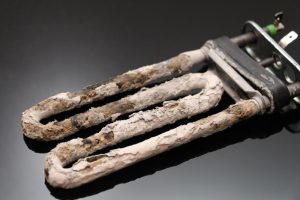If you live in Missouri you may have heard the term “hard water” and asked yourself: “What does hard water mean?” Hard water is a common issue in households in our state, and while it’s not necessarily harmful to your health, it can be tough on your plumbing, appliances, and daily comfort. In this blog, we’ll break down what hard water is, how it affects your home, and what you can do about it, including the benefits of whole house water softeners installed by our team.
What Is Hard Water?
Hard water is water that contains high levels of dissolved minerals, primarily calcium and magnesium. These minerals are naturally present in the ground and get picked up as water moves through rocks and soil. The result is water that’s “hard” in the sense that it’s packed with mineral content.
The signs of hard water are easy to spot once you know what to look for. Common indicators include white, chalky spots on dishes, cloudy drinking glasses, soap scum buildup in showers, and dry, itchy skin after bathing. You may also notice your soap and shampoo don’t lather as well as they should, forcing you to use more product than necessary.
While hard water isn’t a health hazard, it’s a nuisance for homeowners. Its real impact is seen in the damage it can cause to your home’s plumbing system, appliances, and overall water quality.
How Hard Water Affects Plumbing & Appliances
When hard water flows through your plumbing, it leaves behind mineral deposits called limescale. Over time, limescale builds up on the inside of pipes, narrowing the passage for water. This restricts water flow, leading to lower water pressure and clogged pipes. As the buildup worsens, it can increase the likelihood of plumbing repairs, pipe replacements, and other costly maintenance issues.
Hard water impacts your pipes and appliances. Water heaters, washing machines, dishwashers, and even coffee makers all suffer from the effects of hard water. In water heaters, sediment collects at the bottom of the tank, reducing the system’s efficiency and forcing it to work harder to heat water. This can result in higher energy bills and a shorter lifespan for your water heater.
On a personal level, hard water impacts your daily routine. It’s harder to lather soap, shampoo, and body wash, which means you’re using more product than necessary. Hard water also leaves a residue on your skin, making it feel dry and itchy. If your hair seems dull and lifeless after washing, hard water could be to blame.
Benefits of a Whole House Water Softener
A whole house water softener works by removing the minerals that make water “hard.” This leaves you with “soft” water that’s gentle on pipes, appliances, and your skin. Here are some of the benefits:
- Protects Plumbing: A water softener extends the life of your home’s plumbing system and reduces the need for costly repairs.
- Preserve Appliances: Water heaters, washing machines, and dishwashers operate more efficiently and last longer when they don’t have limescale buildup.
- Improves Personal Comfort: Say goodbye to dry, itchy skin, dull hair, and stiff laundry. With soft water, soap, and shampoo lather better, leaving your skin and hair feeling cleaner and softer.
- Reduces Costs: Less maintenance, fewer repairs, and longer-lasting appliances mean long-term savings for your household.
If you’re tired of dealing with hard water’s negative effects, contact us to discuss water softener options for your home. A quick consultation and a professional installation can lead to cleaner dishes, softer skin, and a plumbing system that’s built to last.
Contact Performance Plumbing today for water softener services in St. Louis, MO today!

